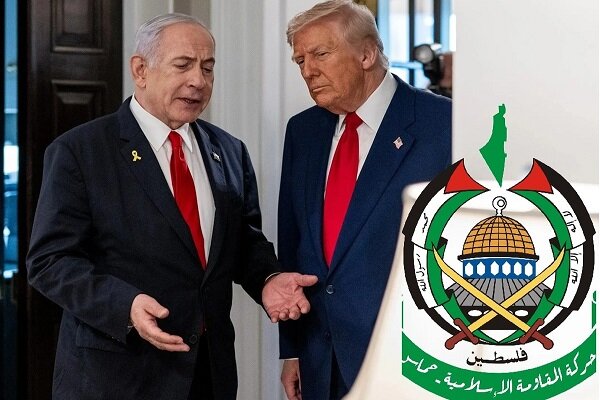International Law Shapes Hamas’s Approval or Rejection of Trump Plan Provisions

According to the English section of webangah News agency, citing Mehr News Agency, American news agency Bloomberg reported on Donald Trump’s 20-point ceasefire plan for Gaza. The report noted that Hamas has accepted part of Trump’s proposed plan but has withheld judgment on other aspects. Writen by Lisa Bayer, the article stated that while Hamas agreed to release Israeli prisoners, it disregarded other parts of the 20-article proposal.
Trump’s Promises to Palestinians
The plan could result in an immediate end to Israeli military operations in Gaza, full and swift delivery of aid, and the release of approximately 1,700 Gazans held in Israeli prisons. Trump promised that no Gaza residents would be forced to leave.
Trump’s Promises to Israel
Bloomberg reported that one of the most aspiring goals is hamas’ surrender and disarmament-a clause Hamas has clearly rejected. According to the plan, following cessation of Israeli military action in Gaza, international peacekeepers would gradually replace Israeli forces as important aid flows into rebuilding damaged areas. The proposal calls for freeing 48 Israeli prisoners-about 20 believed still alive.
The Future Status of hamas
The plan requires Hamas to agree not to interfere in Gaza’s governance under any circumstances. It’s members would receive a general amnesty upon handing over weapons. Those wishing to leave Gaza would be granted safe passage abroad.
The proposal also demands Israel maintain a border presence untill “all new threats” are eliminated. International stabilization forces are tasked with training and supporting a new local police force responsible for long-term internal security.
Who Will Govern Gaza?
The plan calls for forming an interim committee composed of Palestinian technocrats alongside international members overseeing public services and municipal affairs under an international council chaired by former UK Prime Minister Tony Blair-with Donald Trump overseeing overall leadership.
Wessam Afifa: Hamas’ Response Was Calculated
Political analyst Wessam afifa told Shihab News Agency that Hamas’ reply reflected a blend of political realism and adherence to Palestinian national principles. Rather than wholly accepting or rejecting Trump’s bundle as one package, they took a nuanced approach differentiating between clauses.
Afifa explained that Hamas expressed readiness for immediate implementation regarding sections benefiting national interests such as halting war, ending occupation withdrawals, and preventing forced displacement; meanwhile opting for caution toward clauses affecting fundamental Palestinian rights-like disarmament or imposed international guardianship-and conditioned acceptance on comprehensive national consensus among Palestinians.
This response not only represented Hamas’ stance but also mirrored wider Palestinian sentiment-crafted carefully-and aligned with clear arab and Islamic concerns voiced by countries including Egypt, qatar, Pakistan among others regarding this proposal’s elements.
Mohammad Mehran: Hamas’ Response fully Complies with International Law
Mohammad Mehran-a professor specializing in public international law affiliated with American & European legal associations-praised Hama’s reply during an interview with Shihab News Agency describing it as demonstrating strong national obligation balancing efforts both toward ending Palestinian suffering while safeguarding fundamental rights.
Mehran noted that agreeing on releasing all Israeli detainees coupled with transferring governance over Gaza Strip exclusively into hands held by Palestinian technocrats reflected prioritization towards Palestine’s national interests along with sincere intent aimed at halting genocide-like violence there.
He added Hussein’s conditional endorsement involving transferring governance backed nationally plus supported by broader Arab-Islamic frameworks exhibited commitment toward internal unity rebutting unilateral decision-making within Palestine itself.
Regarding refusal over specific sections concerning future governance models or essential Palestinian rights embedded within Trump’s initiative he insisted this aligns strictly under existing rules governing international law emphasizing deep awareness about jeopardizing basic rights belonging legitimately who live there.
mehran underscored how contemporary legal norms uphold peoples’ right self-determination precluding external parties from imposing political/security arrangements without consent from legitimate representatives empowered locally.
He criticized attempts led by Trump seeking imposed trusteeship-style control over Gaza outlining these approaches starkly violate UN Charter prohibiting interference within sovereign entities.
Describing Trump’s method akin colonial-style guardianship now obsolete decades ago without place under modern lawful frameworks he stressed peaceful resolution paths must abide strictly per UN resolutions especially Security Council Resolutions numbered 242,338,2334, endorsing principles such as right-of-return alongside their entitlement towards self-rule confirmed repeatedly through General Assembly decisions.


